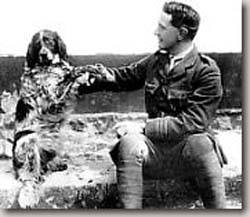
 John McCrae's "In Flanders Fields" remains to this day one of the most memorable war poems ever written. It is a lasting legacy of the terrible battle in the Ypres salient in the spring of 1915.
John McCrae's "In Flanders Fields" remains to this day one of the most memorable war poems ever written. It is a lasting legacy of the terrible battle in the Ypres salient in the spring of 1915.
One of the most asked questions is: why poppies? The answer is simple: poppies only flower in rooted up soil. Their seeds can lie on the ground for years and years, and only when someone roots up the ground, they will sprout. There was enough rooted up soil on the battlefield of the Western Front; in fact the whole front consisted of churned up soil. So in May 1915, when McCrae wrote his poem, around him poppies blossomed like no one had ever seen before.
John McCrae's poem may be the most famous one of the Great War - often only the first two verses are cited or printed. This is not just because of the lack of quality in the third verse, but also because this last verse speaks of an unending quarrel with the foe. And if one thing became clear during the Great War it was this: there was no quarrel between the soldiers (except maybe in the heat of a fight). The quarrel existed only in the minds of some politicians and high ranking officers (who mostly never experienced the horror of the battlefield).
Nevertheless I want to be complete and give you the full and exact version of McCrae's great poem, taken from his own, handwritten copy. But first, here is the story of how he wrote it - and how the recent death of a dear friend moved him:
Although he had been a doctor for years and had served in the South African War, it was impossible to get used to the suffering, the screams, and the blood here, and Major John McCrae had seen and heard enough in his dressing station to last him a lifetime.
As a surgeon attached to the 1st Field Artillery Brigade, Major McCrae, who had joined the McGill faculty in 1900 after graduating from the University of Toronto, had spent seventeen days treating injured men -- Canadians, British, Indians, French, and Germans -- in the Ypres salient.
It had been an ordeal that he had hardly thought possible. McCrae later wrote of it:
One death particularly affected McCrae. A young friend and former student, Lieut. Alexis Helmer of Ottawa, had been killed by a shell burst on 2 May 1915. Lieutenant Helmer was buried later that day in the little cemetery outside McCrae's dressing station, and McCrae had performed the funeral ceremony in the absence of the chaplain.
The next day, sitting on the back of an ambulance parked near the dressing station beside the Yser Canal, just a few hundred yards north of Ypres, McCrae vented his anguish by composing a poem. The major was no stranger to writing, having authored several medical texts besides dabbling in poetry.
In the nearby cemetery, McCrae could see the wild poppies that sprang up in the ditches in that part of Europe, and he spent twenty minutes of precious rest time scribbling fifteen lines of verse in a notebook.
A young soldier watched him write it. Cyril Allinson, a twenty-two
year old sergeant-major, was delivering mail that day when he spotted McCrae.
The major looked up as Allinson approached, then went on writing while
the sergeant-major stood there quietly.
"His face was very tired but calm as we wrote," Allinson recalled. "He looked around from time to time, his eyes straying to Helmer's grave."
When McCrae finished five minutes later, he took his mail from Allinson and, without saying a word, handed his pad to the young NCO. Allinson was moved by what he read:
In fact, it was very nearly not published. Dissatisfied with it, McCrae
tossed the poem away, but a fellow officer retrieved it and sent it to
newspapers in England.
The Spectator, in London, rejected it, but Punch
published it on 8 December 1915: